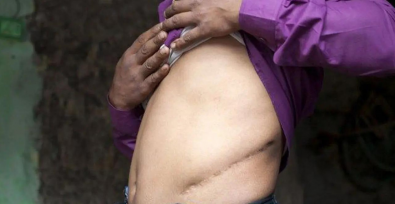The illegal trade in human organs has reached epidemic levels, yet public awareness remains alarmingly low. Nigerian human rights lawyer Frank Tietie believes this crisis has not attracted enough condemnation, explaining that the scale of the problem demands far more attention. “One would have expected the level of public condemnation against it would have been much higher, but that’s not the case,” Tietie told DW.
According to a report by Global Financial Integrity (GFI), the illegal trafficking of organs generates between $840 million and $1.7 billion annually. This staggering figure underscores the depth of this covert trade, which often preys on the most vulnerable.
More about exploitation than altruism
Organ trafficking is deeply rooted in economic disparity, where desperation and poverty force people into situations where they are compelled to sell parts of their bodies. “Organ donation is driven mainly by poverty rather than the noble motivation of trying to save a life,” Tietie explained, revealing how this trade is more about exploitation than altruism.
For many, organ selling seems like a lifeline out of financial hardship. However, this false hope is a hallmark of modern slavery, where vulnerable individuals are deceived or manipulated into trading their organs for quick cash, often receiving far less than promised.
DW reports,
The sale of human organs is illegal across Africa. However, in 2022, the Kenyatta National Hospital in Nairobi, Kenya, felt compelled to put out a Facebook post reading “We Don’t Buy Kidneys!” after the medical institution said “How much for my kidney?” was their most inboxed question.
A growing insidious market
According to the Global Observatory on Organ Donation and Transplantation, less than 10% of required transplants are performed worldwide, which has led to some patients trying to obtain organs illegally.
The illegal organ trade is expanding rapidly across Africa, with countries like Egypt, Libya, South Africa, Kenya, and Nigeria being the most affected. This black market is not just about desperation-driven sellers—it involves complex international networks of traffickers, medical professionals, and local criminals.
These organ trafficking networks operate like sophisticated criminal syndicates. The process of removing and transplanting organs requires skilled medical professionals who collude with traffickers to carry out operations while avoiding detection from law enforcement. Politicians and local power structures often play a role in perpetuating this cycle of exploitation, ensuring that the flow of organs from poor to rich remains uninterrupted.
According to Tietie,
The prospect of financial gain from human organs has led to fears that so-called baby factories in Nigeria could also become targets for organ traffickers, highlighting “the close link between the trafficking of persons and organ harvesting.”
Tietie emphasized that local medical centers also bear the responsibility not to prey on vulnerable people.
“What happens when medical personnel, doctors at very at elitist hospitals in Abuja in Lagos, actually hold themselves out to their rich patients and tell them not to worry, that they can arrange a poor trading boy to sell these organs?” he said.
End the vicious cycle – take action
This form of modern slavery has devastating consequences. The human cost extends beyond the physical harm to organ donors, many of whom return with little financial gain and lasting scars, both physical and emotional. Willis Okumu, a senior researcher at the Institute for Security Studies, observed young men in Kenya who, after selling their organs, were left vulnerable and at risk of becoming recruiters for the illegal trade, drawing others into this insidious market.
As the illegal organ market grows, so too does the exploitation of society’s most vulnerable, perpetuating a vicious cycle of modern slavery that demands urgent global attention. Take action now by signing our petition to stop forced organ harvesting.





Freedom United is interested in hearing from our community and welcomes relevant, informed comments, advice, and insights that advance the conversation around our campaigns and advocacy. We value inclusivity and respect within our community. To be approved, your comments should be civil.